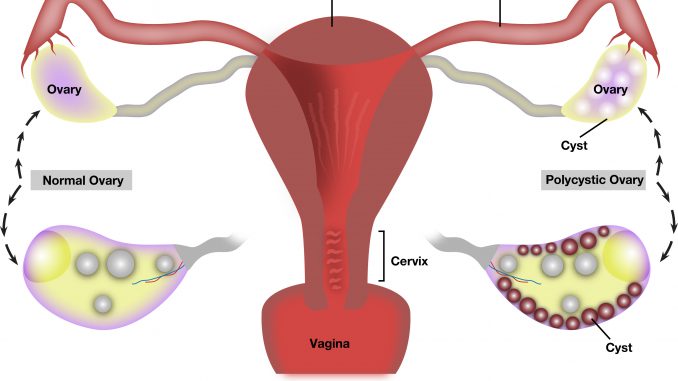POLYCYSTIC OVARIAN SYNDROME -PCOS
PCOS – Polycystic Ovarian Syndrome is a hormonal, metabolic disorder that has no cure but it’s symptoms can be managed. If left untreated, it can lead to life threatening diseases such as diabetes, high blood pressure and heart disease.
Common Symptoms are:
🔘Heavy and prolonged periods
🔘Unwanted facial/body hair
🔘Acne
🔘Weight gain
🔘Difficulty getting pregnant
🔘Anxiety and Depression
🔘Pelvic pain
🔘Irregular periods
🔘Ovarian Cysts
🔘Patches of dark skin on the neck and other areas of the body.
A normal woman’s ovaries contains a tiny amount of male sex hormones(androgens) but a woman with PCOS has slightly more androgens and this stops ovulation and causes symptoms such as acne, irregular periods, facial hair as well as insulin resistance. This high androgen hormones also trigger weight gain, particularly in the upper body. Studies have also shown that women with PCOS are at three times higher risk for endometrial cancer, two times higher for ovarian cancer and four times higher for breast cancer. Nigeria alone records more than 1000 cases per year yet there is little or no awareness on what it is or how to cope with its horrifying symptoms. Most women who have PCOS do not even know it. A study showed that 70per cent of women who suffer from PCOS have not even been diagnosed. PCOS is also the leading cause of infertility in women. 1 in 10 women suffer from this disease.
5 TIPS ON HOW TO COPE WITH PCOS.
(1) PCOS is real. It has no cure and if left untreated, can lead to life-threatening diseases such as depression, diabetes, high blood pressure etc. Furthermore, it is very possible for two women with PCOS to have different collection of symptoms that eventually lead to diagnoses. GET DIAGNOSED!
(2) The only way to successfully manage PCOS is by living a very healthy lifestyle. There is no other alternative or quick fix. It has to be a lifestyle or all the horrid symptoms and linked diseases would start to lurk around. Get proper information on what to eat and what not to eat. With PCOS, a general diet plan would not work for you.
(3) Regular physical examination is very important depending on your symptoms and what your specialist recommends. Medical history, diagnostic procedures, physical examinations, loads of pelvic scans need to be reviewed from time to time to monitor your progress.
(4) ALWAYS ask questions. Knowledge is Power. Find out everything possible you can. Never leave everything to your doctor. If you are not sure about anything ASK your doctor or do a research. In addition, do a mini research on every medication you have been placed on. Make records of your reaction, progress or side effects.
(5) Be open-minded. You can learn from anyone. Literally anyone. Unfortunately relying on doctors alone isn’t the best. Join groups, no one understands better what you are going through than someone walking in similar shoes. You get to share ideas, tips and eventually make wonderful friends.

Author: Adedamola Ladejobi is a certified Personal Nutritionist and a Weight loss Expert. She is the Founder/CEO of ASKDAMZ, a weight management, health, and wellness company. She has used her successful lifestyle change and platform (both physical and social media) to touch the lives of thousands of people around the world. She works full time as a wellness Coach ensuring that She explores her client’s greatest health concerns,weaknesses and goals. Thereby using these obstacles in achieving set goals.
Social Media Handles
Instagram : @askdamz
Twitter: @askdamz1




